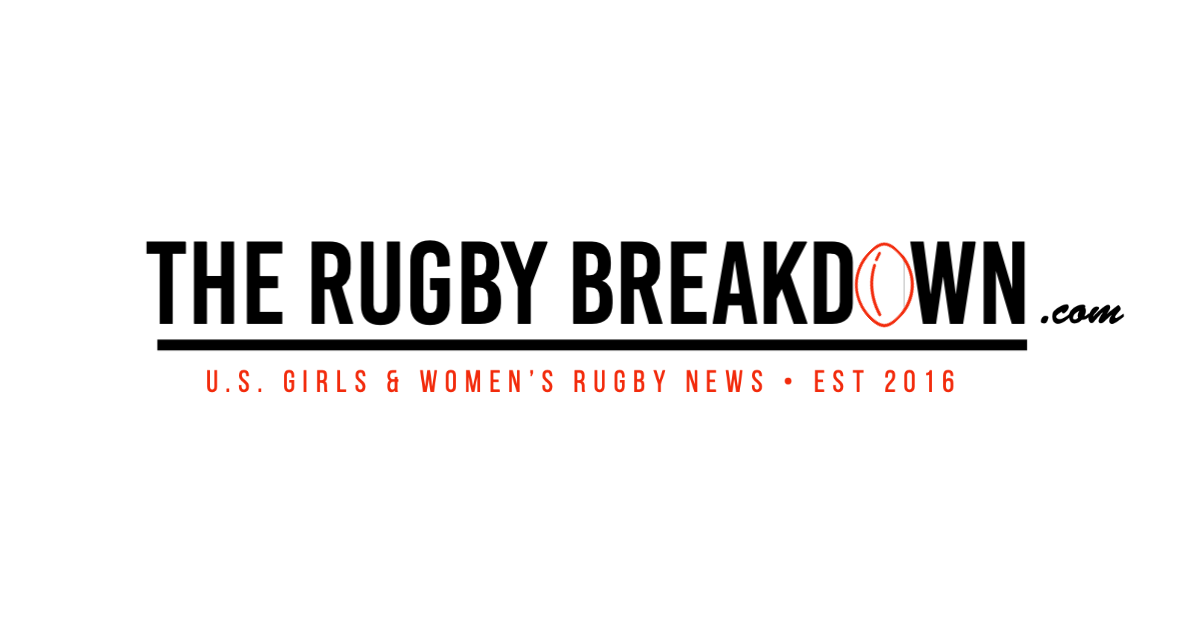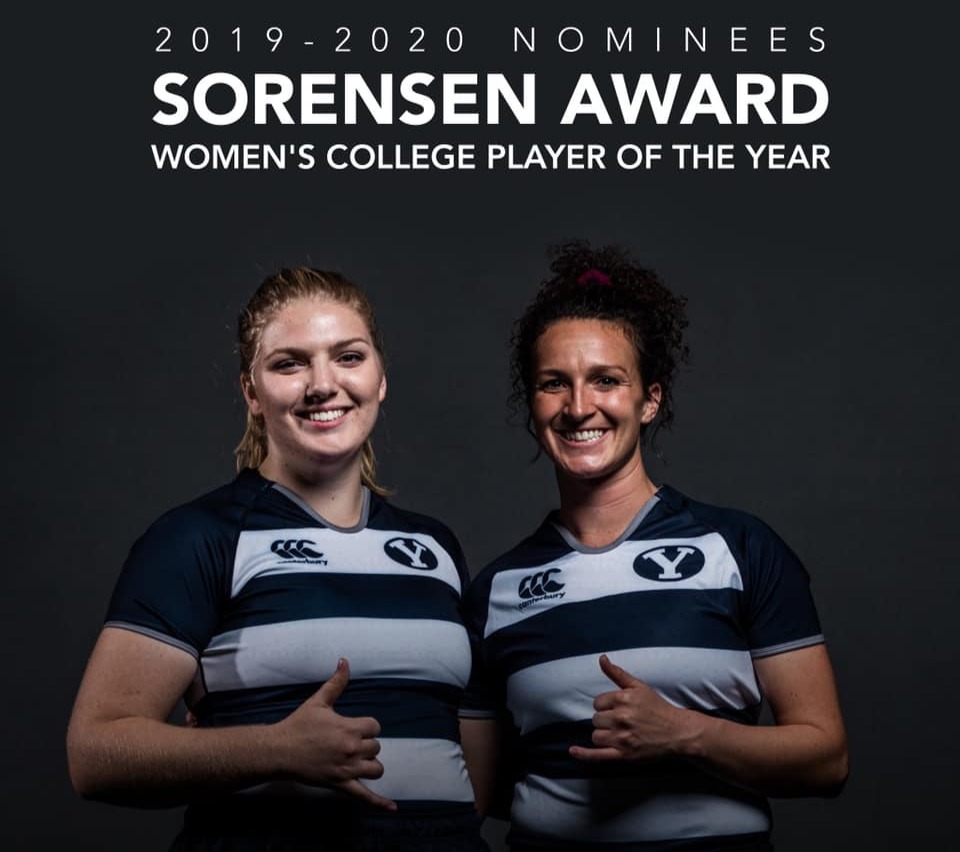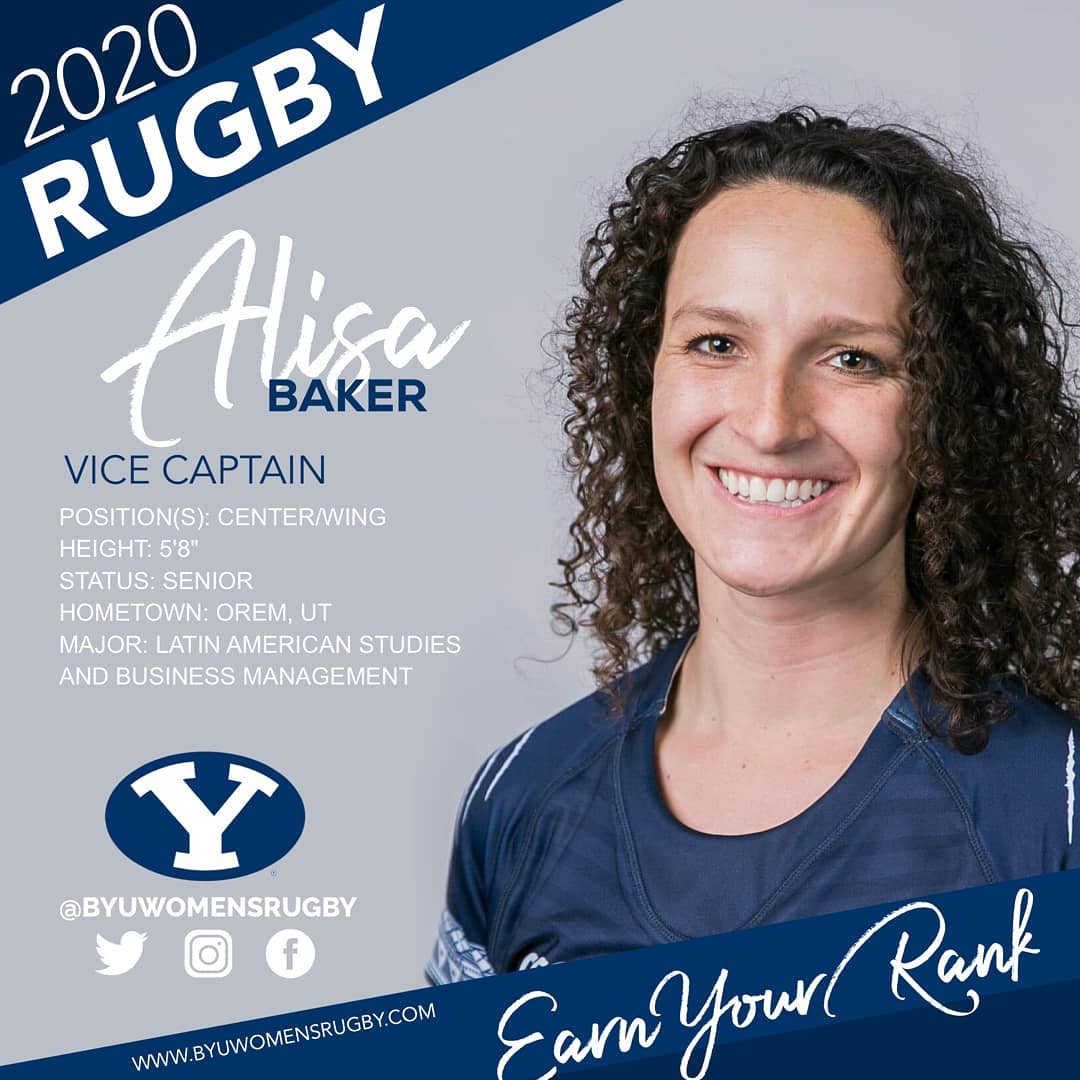BYU co-captains Alisa (a-LEE-sa) Baker and Emily Briggs were both nominated for the 2020 MA Sorensen Award, which honors the top women’s collegiate player in the U.S. The seniors’ careers ended beside each other in Provo, Utah, but they took very different routes to the rugby team. The juxtaposition of those different journeys worked well in terms of leadership, and the Cougars were the heavy favorites to repeat as DI Spring College Championship titleholders.
Briggs played a bunch of sports growing up in Minnesota – volleyball, basketball, soccer, Nordic skiing, rowing, dance – and found rugby in 8th grade. She learned the game with the Orono Nightmares, and in her final year of high school, 2014-15, moved to Texas but kept playing.
“I have always loved my coaches,” Briggs thought on early influences. “My coaches at Orono gave me my foundational love for the game and a great holistic approach to understanding rugby. My experience at Plano rugby for just my senior year opened my eyes to sevens, which absolutely changed my approach to the game.”
Briggs was quickly identified as a dangerous flanker / inside center, and with time moved to No. 8, lock and prop – a positional migration that reflects flexibility and power. She diversified her experience through player-development camps, and then the Midwest Thunderbirds started calling. The U-19 regional all-star program exposed her to that next level of play, among other aspects of the sport.
“That changed my rugby path forever,” Briggs thought on her first Midwest U19 camp invite. “I went when I was really young – I think I was the youngest player there, at the age of 15. I was not ready for the mature culture of that team. There [were] a lot of things that I found I didn’t really like, and that is what drove me to find a team that [I] knew would have a reputation of respect, honor, and high standards. BYU was absolutely the best team by far with those standards that I wanted.”
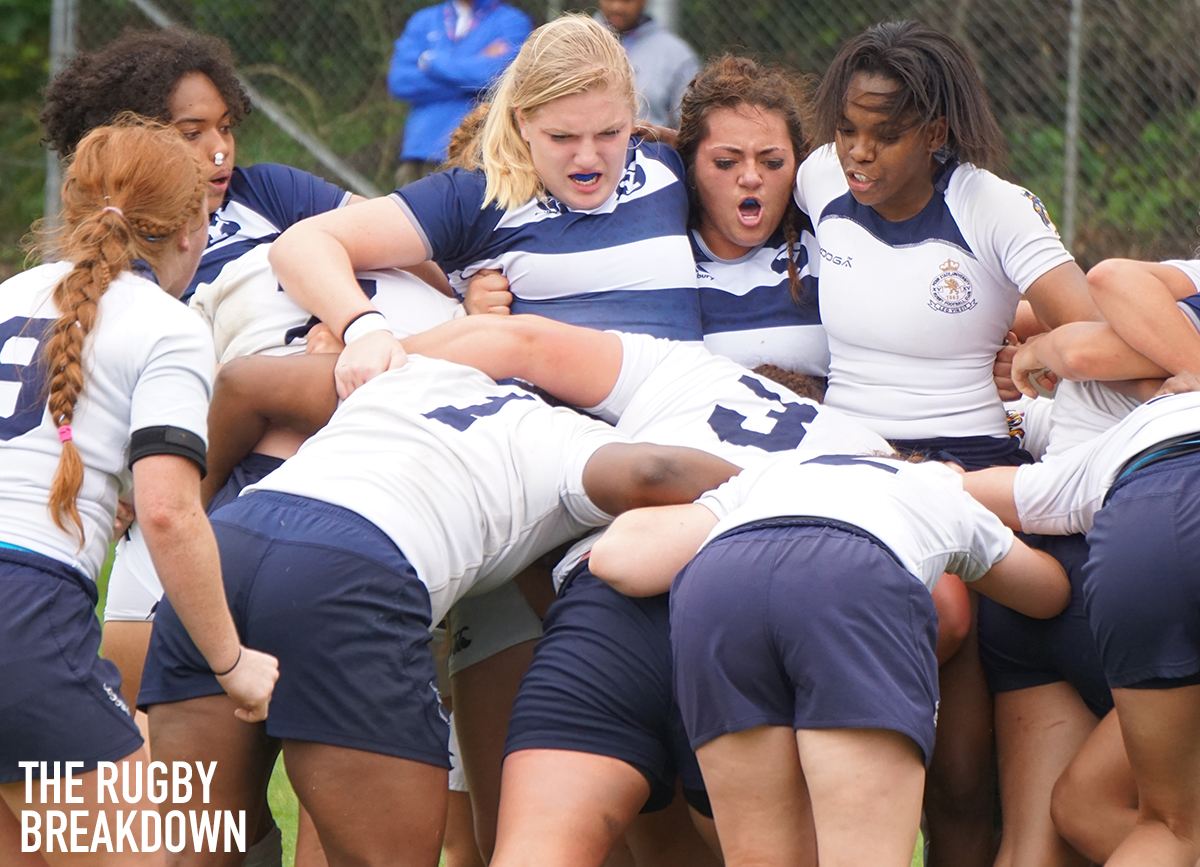
Photo: Jackie Finlan
Briggs enrolled in fall 2015, a pivotal time for the women’s rugby program. That October, BYU officially recognized the team as an extramural sport, which Student Life oversees.
“Before [the extramural status], we had to do a lot of fundraising, and playing on the team was a huge commitment,” Briggs noted the amateur-rugby realities with which she was already familiar. “Now, many girls on the team go to school, play rugby, and work, which would have been unthinkable before. This allows us to open our doors to so many more girls who are talented but wouldn’t have been able to commit to the hours of Cougar Women’s Rugby [prior to Oct. 2015]. However, this also means that rugby isn’t the massive part of their lives that it was before. There’s a different dynamic to being part of BYU and we’re still figuring out how to do that best.”
The shift aligned with the creation of the DI Elite, and BYU was a founding member of a competition that catered to best non-NCAA varsity programs in the country. In spring 2016, the Cougars advanced to the final against Penn State, and Briggs started at tighthead prop opposite Eagle Azniv Nalbandian. That championship, which Penn State won, featured a host of future USA 7s and 15s players. Briggs then departed for her 18-month LDS mission in Micronesia, namely Guam, and connected to new people through rugby.
“I could automatically relate to people that were so different from me because of the love of the sport,” Briggs reflected. “But I also saw the different approaches to the game. My eyes were opened to the culture that accompanies the game of rugby. Although the principles of respect and honor were always present, I saw that rugby can also be a pick-up game! I never saw that in America.”
For Baker, her LDS mission offered an opportunity to re-evaluate her priorities.
The Orem, Utah, native had played soccer since age six and then pivoted to track in high school. She enrolled at BYU in fall 2013 and joined the track team as a freshman. In the middle of the track season, she accepted an invitation from then-assistant coach Kara Remington to check out the rugby team (which was called “Women’s Cougar Rugby” then and not affiliated with BYU).
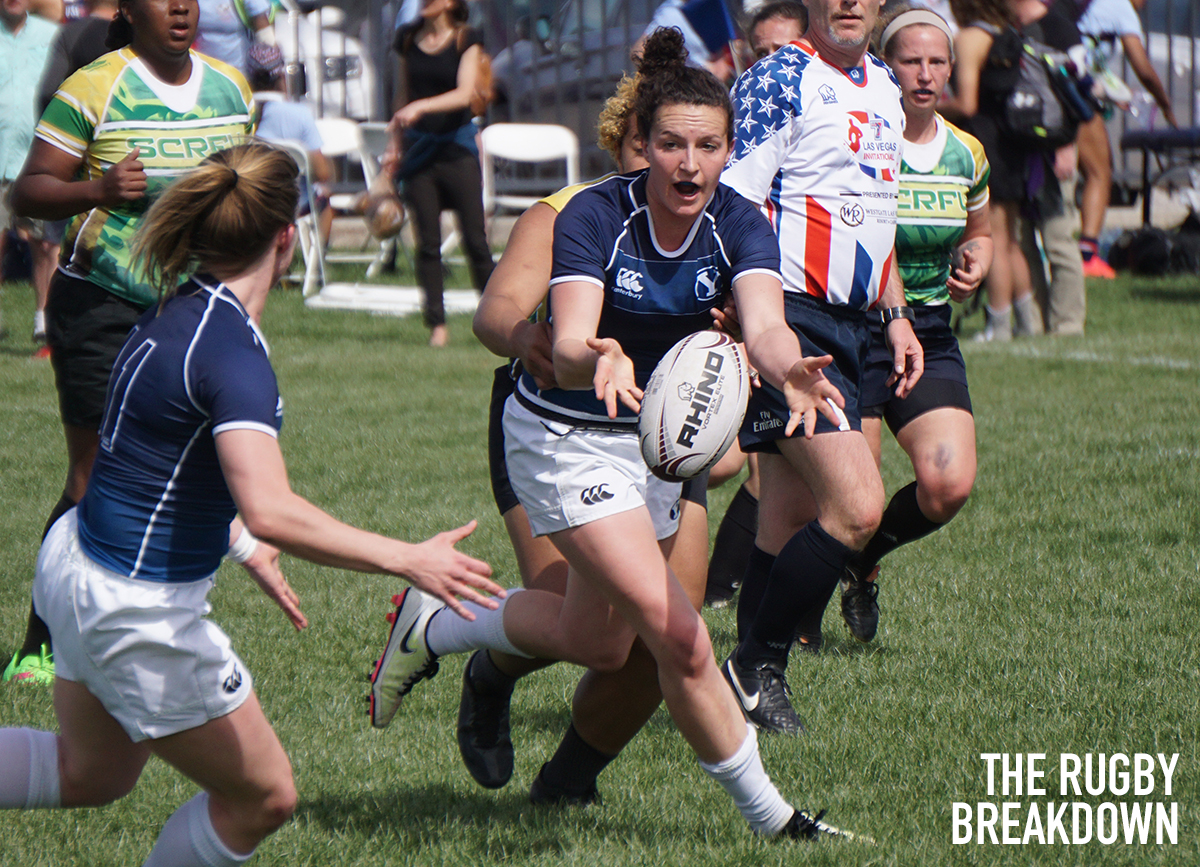
“Freshman-year rugby was really refreshing from the team-sport aspect and the physicality of it,” Baker said of that one month with the team. “The biggest thing I had missed [from soccer] was fighting for the ball or being on defense – the physicality of playing next to another player. I’m an aggressive person when it comes to sports and rugby felt like it was made for me. I can be that person but in a controlled way that was safe.
“But the biggest thing that drew me in and brought me back was the people on the team,” Baker continued. “It’s very different from other teams, just how inclusive and good at teaching and patient everyone is, since no one’s played before. Track is very individual and you focus on yourself.”
Meighan Stevens was influential during that one-month rugby sample. She came from the BYU track team to rugby, and never regretted the switch.
“She talked to me a lot and I always appreciated how she reached out to me in that way,” Baker said. “Watching her and how much she loved rugby after track, I thought about that a lot when I was considering what to do.”
Baker embarked on her LDS mission to Mexico, and during those 18 months away from school and sports, she faced a reality: She was burnt out on track. She was ready to try something new, and rugby’s notes of connectivity and controlled aggression lingered. Fortuitously, head coach Tom Waqa reached out and indicated that there was a spot waiting for her on the rugby team, if she wanted it. She put the blue-and-white hoops back on in fall 2016, the start of her sophomore year.
The cultural dynamic was the same, but as Briggs mentioned, Baker returned to a team that had no fundraising responsibilities, could train and play games on campus, and had bus transportation, instead of vans, to games. BYU had come out of its first DI Elite National Championship appearance in spring 2016, and Baker leaned on team captain and halfback Nicole McCullough and friend and flanker Justina Grubb to orient her in this new environment.
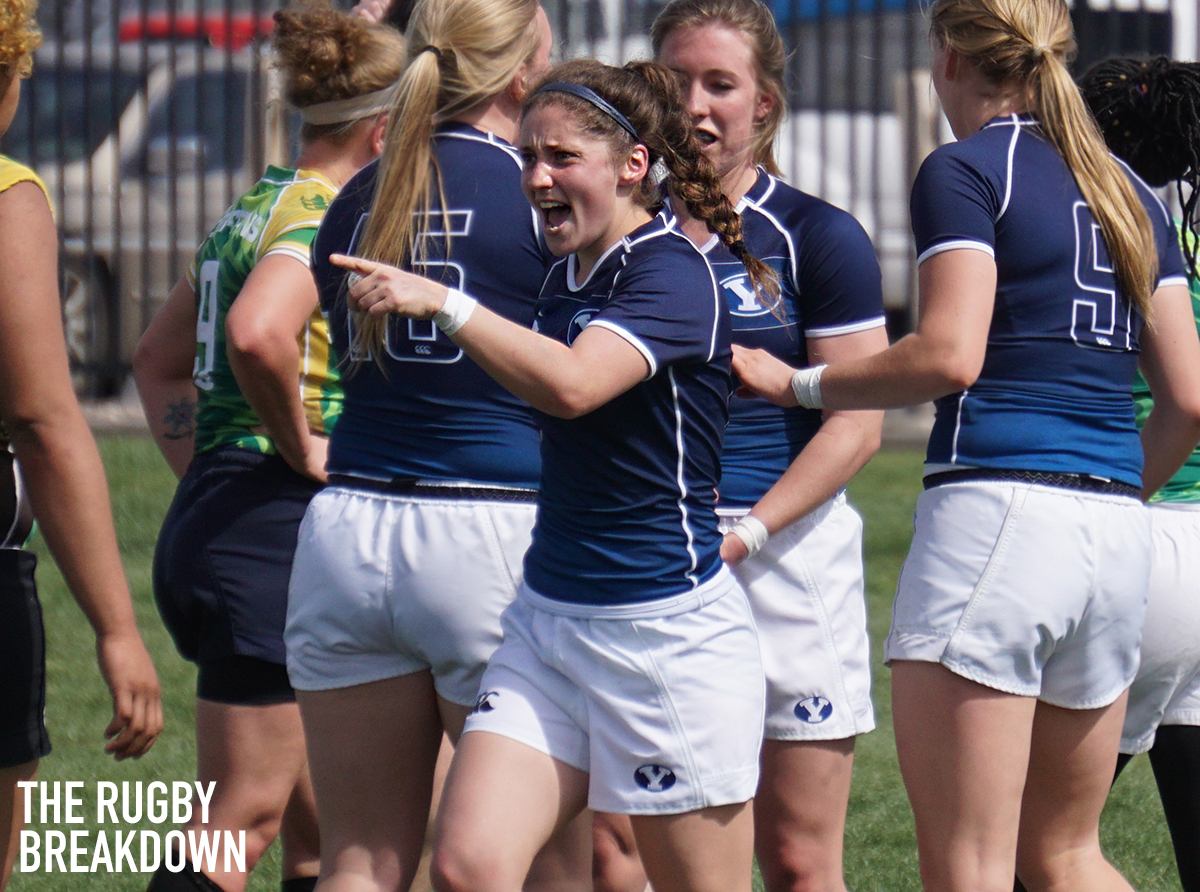
Baker’s role model, Nicole McCullough / Photo: Jackie Finlan
Baker got her first taste of DI Elite rugby in spring 2017, but BYU lost to Penn State in the national semifinals. The consolation match, however, ranks as Baker’s favorite game as a Cougar.
“We played Life for third place and it was a close game the entire time. It was just fun because it was so competitive,” Baker said. “We barely won by one point, because our kicker [Jessica Peterson] scored a dropgoal in the middle of play [in the 79th minute].”
Baker developed at center and wing, and upon first reflection, viewed the two positions with equal but different favor.
“Center is physical but it’s much more of a mental game,” Baker analyzed. “You have to make quick decisions, see space and get the ball there. I love setting up my teammates, opening up space for them as they run off and do their thing. … Also, at center, you get to play defense and be much more aggressive, and do a lot more tackling. That’s the part I love.
“Wing is just fun, especially when you have a good back line that can set you up well,” Baker continued. “I love playing wing when Kainoa [Ah Quin] at fullback and Matalasi [Morrissette] at flyhalf are in the line. They set me up so well. But you can get bored. There are times when I don’t touch the ball for 20 minutes, and then it’s just: Run down the field and score. … So I guess like center more – it pushes me to learn more and watch film and get stronger – but I feel more confident at wing.”
Baker and Briggs finally met and featured together for BYU during the 2017-18 season. The Cougars again advanced to the DI Elite semifinals and fell to Lindenwood. The following day, BYU was meant to play Penn State, but the 3rd place match ended in protest of the pitch conditions. That was BYU’s last DI Elite season as the program transitioned to USA Rugby’s DI spring competition – which does not name a national champion, but two seasonal champions (fall and spring) that never face each other.
“This is a change that’s left me with mixed feelings,” Briggs considered the move from DI Elite to Division I. “Overall, I just feel the longing for more rugby teams all over the U.S., at all levels. It breaks my heart that there are such gaps in rugby experience for collegiate women’s rugby.”
Briggs described the situation in which a talented, geographically isolated program often finds itself. The team needs to prepare for the intensity of the post-season but doesn’t have the local competition to compel that assess-and-adapt process that produces championship teams.
“A rude awakening,” Briggs described the shock of playing defense for the first time all season, in the playoffs. “Suddenly we were back-tracking to catch up with those teams we hadn’t interacted with at all, and would be left lacking when the championships came, despite our best efforts to adapt. Don’t get me wrong, I love winning. But I wish I could win games that also pushed us as a team. I wish there was a perfect place for us to play against great teams and have amazing competition, but right now, our team just tries to control our games and constantly best ourselves.”
Some of that tension was felt during the 2018-19 season, as BYU beat Stanford 65-0 and UC Santa Barbara 49-7 in the DI spring playoffs, and then Virginia Tech 48-0 for the USA Rugby DI Spring Championship title. Briggs scored two tries and was TRB’s choice for MVP.
“The spring championships was a surreal experience. … [T]he whole day felt different,” Briggs revisited the 2019 spring title match. “We all felt the pressure of the game we were going to play, but knew that we had prepared for this moment. I knew, as one of the older girls of the team, that I was standing on the shoulders of legacies that had worked hard in past years that we were now representing. I never assume that we’re going to win, and I never relax in a game no matter that score, so it wasn’t until they put the medal over my head that I felt absolute elation over winning the championship.”
Like Briggs, Baker prefers the toughest competition, but she still appreciated the spring 2019 season. She had arrived at a place where she felt confident in her role on the pitch, and then the coaches backed that self belief by naming her a co-captain for the 2019-20 season.
“That was a real turning point for me,” Baker said. “Being named co-captain with Briggs helped me realize that I was someone who can lead and help other girls learn. But being captain was a scary prospect because I felt like there was still a lot that I didn’t know. I was forced into that spot, and so my knowledge of the game had to grow, because people were always asking me questions. It’s allowed me to take that next leap – realizing that people depend on me and knowing the coaches trusted me.”
This year, BYU joined the DI Pacific Desert conference and its spring 2020 schedule involved seven teams from Arizona and California.
“I’ve been told by my teammates that they find comfort in my presence on the field,” Briggs characterized her role and vibe on the pitch. “I’ve played rugby longer than anyone on BYU rugby, and every rugby game is just that – a rugby game. No matter who we’re playing, it’s just rugby. I try to keep a positive and controlled energy on the field, so that we don’t get down on ourselves or anxious and panicky.
“I also have been told that what I bring to the team is my speeches before games,” the prop continued. “As captain I get a minute before games to get our brains where they should be, and I love that time to talk to my sisters and inspire us to own the game we’re about to play. My co-captain makes fun because I have a different voice I use when I address the whole team, but it works! And I love getting our team energy up before the battle.”
With the schedule kicking off in January, BYU was able to contest all seven league games before the Covid-19 shutdown. The Cougars scored 415 points and relinquished zero. Baker led all point-scorers with 76 (10T, 13C) and Briggs added five tries. The spring unwittingly ended on March 7, when nearly the whole team traveled to St. George for a double-header against the University of Arizona and Arizona State. Later, after the shutdown took hold, this away weekend offered a modicum of contentment.
“It felt like our entire team clicked together that day,” Baker said. “Christina [Miller] talks about what she calls ‘moments of magic,” when you’re in sync, and everyone’s going hard, and it just flows. That game [against Arizona] all of those moments happened. You always get new girls every semester and they’re learning the game and you have to work out the crinkles and the chemistry, but we were in sync that day.”
Everyone who didn’t play in the first game got time against ASU, and for some players, it was the first time they dressed for a rugby game. Having that full-circle experience – from the near-perfect performance against Arizona to watching the next generation model themselves after the veterans – made for a very fulfilling ending to the season.
“It salved the bitterness of the season ending early,” Baker said. “It’s still sad, but it’s comforting that that had been our last weekend together.”
This past season has been Baker’s favorite due to the extra effort she put into it. She had to consider what her teammates and coaches needed, and how they’d be best served, and the return was unquantifiable.
“Being on that team can change your life if you let it change you,” Baker spoke to her returning teammates and future Cougars. “Invest in your relationships with teammates, coaches and trainers, because they’re like a little family. We have a saying, ‘Sisters not teammates,’ and that is real.
“Another lesson I learned from rugby is don’t be afraid to do the things you need to do,” Baker concluded. “Facing fears, tackling something new, making mistakes – these are the things I’d worry about before every game. I’d be so nervous, especially the first couple of years, but playing rugby has taught me to stand up to those fears and overcome them. Rely on those around you because they’re here to help you.”
Briggs echoed those sentiments, indicating that it was the support of her teammates that helped her through the heartbreak of the season ending early. Both Baker and Briggs intend to keep their rugby careers intact. Baker is graduating at the end of the month with a degree in Latin American Studies and Spanish Studies and will enter the working world before finding a new team. Briggs, a psychology major, intends to eventually go to grad school but is considering next moves for rugby.
“I have gotten some offers from other programs, but I really want the sport to grow, so I’m trying to find the best way for me to do that,” Briggs concluded. “I know I want to coach, and it’s a little bit of a dream of mine to run player improvement camps because those helped me a ton. For now, though… I’ll be staying inside.”
BYU #EmilyBriggs #AlisaBaker

